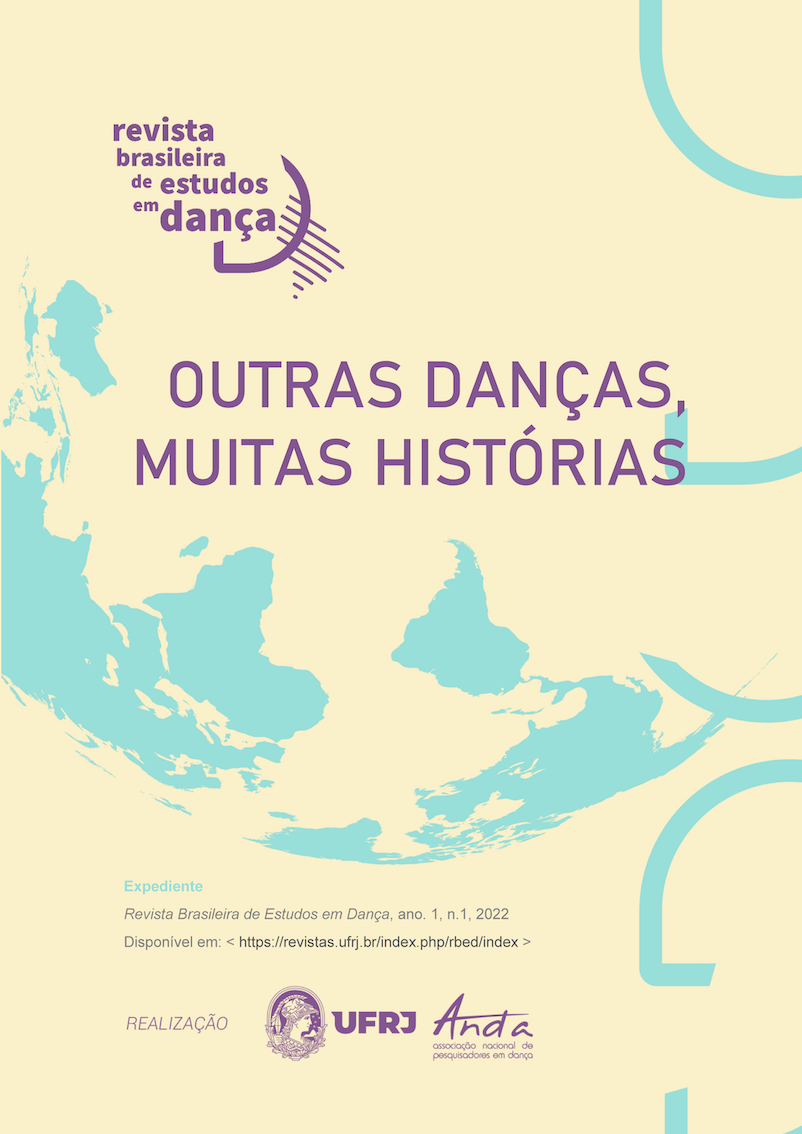Making history on stage:
bodies of the present and stories of possible pasts
DOI:
https://doi.org/10.58786/rbed.2022.v1.n1.53207Keywords:
Historias performadas, Interdiscursividad, Conocimiento histórico, Metáfora, FeminismoAbstract
This article explores modes of revision of assumptions of dance history, through scenic/performance objects produced in Buenos Aires (Argentina) in the 2010s and which we call "performed histories" (EIR (2012) by Marina Sarmiento, María sobre María (2016) by Lucía Llopis and Graciela Martínez, cosas, cisnes (2019) by Sofía Kauer and Nicolás Licera). This implies understanding these artistic manifestations as modes of production of historical knowledge different from that of a hegemonic model that, in its universalist and linear pretensions, determines the derivative character of other discourses. As instances of resistance to that dominance which, even when criticized, remains in force, the interdiscursive interpretation of these objects contributes to the construction of a situated historiography, and enables new readings from a perspective critical of intrinsically patriarchal hierarchies and legitimizations.
References
DE NAVERÁN URRUTIA, Isabel. La danza: aliada perfecta del pasado. AusArt Journal for Research in art. v. 3 n.1.p. 41-53, 2015.
ENADEAU, Corinne. La paradoja de la representación. Buenos Aires: Editorial PAIDOS, 2006.
AUTOR/A. Intensidades del presente. Historias performadas y mujeres que danzan todavía. BERTÚA, Paula y TORRE, Claudia (Coord.) en Fronteras de la literatura. Artistas, géneros e intermedialidad. Tomo V, Historia feminista de la literatura argentina. Villa María: EDUVIM, en prensa.
GIUNTA, Andrea. Feminismo y arte latinoamericano. Historias de artistas que emanciparon el cuerpo. Buenos Aires: Siglo Veintiuno editores, 2019.
MAFFÍA, Diana. Contra las dicotomías: feminismo y epistemología crítica. KOROL, Claudia Korol (comp.) en Feminismos populares. Pedagogías y Políticas. Buenos Aires: Ed. Chirimbote/América Libre/El Colectivo/Pañuelos en Rebeldía. 2016, p. 139 a 153.
PÉREZ ROYO, Victoria. 2010. Replantear la historia de la danza desde el cuerpo. NAVERÁN, Isabel (ed.) en Hacer Historia: Reflexiones desde la práctica de la danza. Barcelona: Mercat de les Flors p. 53-68.
POLLOCK, Griselda. Visión y diferencia. Feminismo, feminidad e historias del arte. Buenos Aires: Fiordo, 2015.
TAMBUTTI, Susana. y AUTOR/A. Memórias do presente, ficcoes do pasado. GUARATO, Rafael (org.) en Historiografia da dança: teorias e métodos. São Paulo: Annablume, 2018, p.157-179.
TAYLOR, Diana. El archivo y el repertorio. El cuerpo y la memoria cultural en las Américas. Santiago de Chile: Universidad Alberto Hurtado. (2015 (2003)).
VERON, Eliseo. La semiosis social. Fragmentos de una teoría de la discursividad. Barcelona: Gedisa, 1993.
Sitios web
EIR. (2012/2013). Material de prensa. https://produccioneir.wixsite.com/webeir/concerts
Consultado 26/11/2021
Graciela Martínez, cosas, cisnes. (2019). Material de prensa. https://www.buenosaires.gob.ar/festivalesba/foco-buenos-aires-danza-contemporanea/graciela-martinez-cosas-cisnes
Consultado 27/11/2019
Graciela Martínez, cosas, cisnes. (2019). https://vivamoscultura.buenosaires.gob.ar/?contenido=1639-foco-buenos-aires-danza-contemporanea
María sobre María. (2016). Material de prensa. http://www.alternativateatral.com/obra45537-maria-sobre-maria
Consultado 27/11/2021
Published
Versions
- 2024-05-10 (3)
- 2023-12-01 (2)
- 2022-07-15 (1)
How to Cite
Issue
Section
License
Authors who publish in the Revista Brasileira de Estudos em Dança are
responsible for the content of signed articles and retain copyright.
They grant the journal the right of first publication with the work simultaneously
licensed under the Creative Commons Attribution-NonCommercial 4.0 License
(Open Archives Initiative - OAI). This feature, used for open-access journals,
allows sharing work for non-commercial purposes and acknowledges
authorship. If the text is later published in another vehicle, the author
must inform that it was initially published as an article in the Revista Brasileira
de Estudos em Dança. Therefore, even if the journal owns the first publication,
authors are entitled to publish their work in institutional repositories or on
their personal pages, even if the editorial process has not been completed.
The journal reserves the right to make normative, orthographic, and grammatical changes to maintain the language standard, respecting the authorial style.

